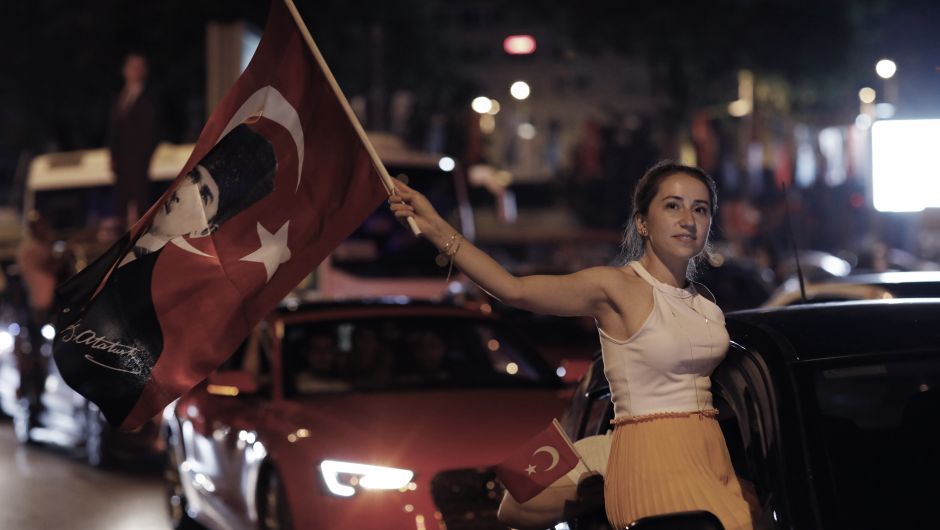Turkey
Writings on the Wall – Turkey After a Democratic Tremble

The residents of the 16-million-metropole Istanbul voted with 54 percent and a 0.8 million margin for the candidate of the opposition party CHP, Ekrem Imamoğlu, in the repeated election on Sunday. His defeated contestant, the former AKP-prime minister Binali Yıldırım, obtained with 45 percent of the votes a significantly worse result compared to the original election at 31st of March.
That voters had to cast their vote once again was necessary after a highly disputed decision of the Supreme Electoral Council of Turkey. freiheit.org spoke to Hans-Georg Fleck, who is Project Director of FNF office in Turkey, about the foreseeable consequences of this result.
What tells us the election victory of the opposition about the position of democracy in Turkey, which many have claimed to be dead?
Firstly, it is worth to note that more than 54 percent of the almost eleven million eligible voters casted a vote for democracy and against all undemocratic manipulations, which aim at establishing an authoritarian system. Already in the first election, the candidate of the secular-Kemalist Republican Party (CHP) had come in first place with a margin of 13.000 votes and was declared the official election winner. Then the debatable decision by the Supreme Electoral Council was announced – apparently due to the political pressure from the presidential palace: of the four ballots that voters had cast on the 31st of March, only the ballot for the mayoral election was declared void because of alleged flaws in the election process. All the other ballots that probably yielded the result expected by the AKP were found to be valid.
The election result of yesterday has rebuffed not only the bold attempt to implement an election system “until the result is right.” The arrogance and ruthlessness of the powerful have even driven hundreds of thousands former AKP-voters to the opposition. In March, Imamoğlu - with the strong support of the Kurdish citizens of the city – had won only 16 of 39 municipal districts. Now he won 28 districts, some of which were regarded as impregnable “fortresses” of the Islamic-conservative AKP.
This shows, firstly, that the AKP, spoiled by victory, and its until then indisputable leader, President Recep Tayyip Erdoğan, cannot trust blindly their fellowship in the circles of Istanbul, maybe not even the Turkish underclass and lower middleclass. Especially these classes notice the consequences of the exacerbating economic crisis. On the other hand, this election result shows that the Turkish democracy is by no means a “hopeless case.” The “other Turkey,” which I also often invoke – it lives, acts, and gives hope for a change back on the way of political and rule-of-law reforms that was left by the AKP-leadership step by step over the last ten years and which was replaced by an ever more radical, anti-West, anti-European, and Islamic course.
What does the victory of Ekrem Imamoğlu mean for the future political development of Turkey?
Now we enter the realm of speculation. However, clear and indisputable is that the democratic opposition in Turkey gained a foothold and governs now the three biggest cities that can hardly be overestimated in their significance for politics and economics, Istanbul, Ankara, and Izmir. The new, 49-years old mayor of Istanbul is a bearer of hope, who gained nationwide prominence because of the trickery in the election by the powerful. President Erdoğan, who started his political rise with his victory in Istanbul’s mayoral election 1994, knew what he was talking about when he explained that whoever wins Istanbul, wins the whole country.
Should it now come to the often-addressed earlier presidential and parliamentary elections – that would normally be held in 2023 – a transition of power does not seem to be precluded at the moment. Will it come to this new elections? The power-political calculus of the AKP would normally speak against it. However, they could involuntarily be forced to do so if their coalition partner and majority provider until now, the right-wing nationalist MHP changes its mind under the impression of developments, for example, in the Kurdish question.
The election is over. Will the winner Ekrem Imamoğlu be able to “deliver?”
This question has been discussed often since the 31st of March. To what extent can the opposition induce change for the country out of the newly won communal positions? Will Imamoğlu or his CHP-mayoral colleges in Ankara (Yavaş), and Izmir (Soyer) satisfy the expectations of their voters reasonably? The structural realities in Turkey, an extremely centralised country, are not favourable. Additionally, the mayors of Istanbul and Ankara have opposing AKP-majorities in the municipal parliaments against them. The AKP will leave no stone unturned to make the life of the new mayors difficult – while at the same time satisfying the interests of their clientele. And this clientele has been spoiled by the provision of communal assets, by communal transfer benefits (e.g. to Islamic foundations) and by generating numerous jobs for partisans and their family members. Hence, it is understandable that many believe to fear for their job.
However, Ekrem Imamoğlu specified the course in the election campaigns: No “right on” with the destructive polarisation of the society, no “payoff” for the AKP-supporters, no new arrogance and lust for power. He approached the “other side” credibly – as the election result proves – and appealed successfully to their sense of fairness, respect, and democracy. Should the AKP-dominated central government and its accomplices on the ground cultivate stonewalling against Imamoğlu (and his colleges), might this have a counterproductive effect – like the trickery in the election after the 31st of March. The AKP had 25 years to make Istanbul the city it is today: metropole and moloch at once. Should one then not allow in fairness the new mayor at least one term to launch something new? Istanbul’s citizens did prove their sense for fairness and moderate extent only yesterday.